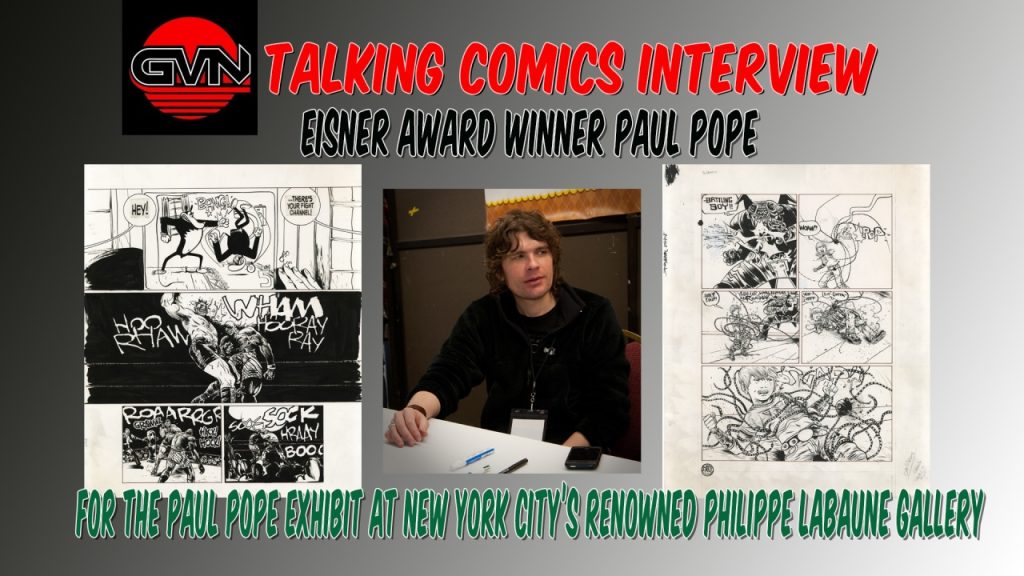When asked about his artistic legacy, renowned cartoonist and artist Paul Pope knew the impact he wanted to have:
“When I do something, I want it to be timeless,” says Pope. “I don’t want to chase the zeitgeist—I want to create something that will feel relevant in 10 or 20 years.”
If you ask fans of his work and his contemporaries, Paul has achieved those goals and then some. To honor his artistic achievements, the Philippe Labaune Gallery in New York just opened The Paul Pope Exhibit in conjunction with Felix Comic Art. The exhibit will present original pieces from seminal comics, including Batman: Year 100, Battling Boy, THB, Heavy Liquid, alongside homages to European artists such as Hugo Pratt and Moebius. In addition, the exhibit will feature some of Paul’s commercial art, including illustrations for the Jon Spencer Blues Explosion and The Grateful Dead, as well as some of Paul’s more personal pieces.
In advance of the Exhibit’s opening, we were fortunate to catch up with the iconic artist to talk about his artistic beginnings, his self-published work, and the new exhibit. So we are honored to welcome Paul Pope to GVN Talking Comics.
Creative Origins
GVN: Thank you for sharing just a bit of your time, Paul. Since this is my first opportunity to chat with you, let’s start with some of your creative background. When did you first take an interest in comic art and whose work inspired you to pursue it?
PAUL: I was reading comics before I could actually read. I grew up in rural Ohio with my mom and later, my grandparents. My dad came back from hockey camp in Ontario one time with this massive slab of vivid color pictures in stacked boxes featuring outrageous and enticing characters with names like Doctor Doom and The Dreaded Dormammu. I was hooked. The stories were like complete heroes journeys cast in garish color amber, to be revisited time and time again. I’d say it was Jack Kirby and then Carl Barks (the “good Donald Duck” artist, as he was called) who first lured me in. This was in the 70s. Comics were really hard to acquire back then, so I had that one collection, Bring On The Bad Guys from Marvel Comics, and later an issue of Kamandi and a few Disney comics. They seemed to come from their own pocket universes, unlike anything else I’d seen before.
Self-Publishing
GVN: As you developed your talent, you self-published some of your work through your own Horse Press, including Sin Titulo (1993) and The Ballad of Doctor Richardson (1994). What made you decide to start your own publishing concern, and did you seek any advice in doing so?
PAUL: I was initially planning to be an art academic and part-time painter, like my first master artist, Pheoris West, whom I studied under at Ohio State University. We covered all the art fundamentals and I also studied art history. He was the one professor I had who was sympathetic to my ambitions to be a professional comic book artist, but he steered me to more traditional art fundamentals such as color theory, anatomy and composition. I broke into comics in the early ‘90s, when the self-publishing movement was gaining steam. Teenage Mutant Ninja Turtles was already huge. Jeff Smith’s Bone was gaining traction, Mike Allred broke in, etc. I started working at a print shop to gain some experience and did my research and gradually made solid plans and contacts in the printing and distribution wings of the comics market. I didn’t need much since I was in my early 20s and it was a good time to take risks. I read a lot of books on “how to self-publish” and “how to start your own company” and later met some older people in the industry who could give me good advice. A lot of it was just persistence and a dash of luck or timing. “Chance favors the prepared mind,” as Louis Pasteur said. It’s been one of my mottos since then.
GVN: Eventually, you did work for numerous publishers, including Kodansha, Japan’s manga publisher, First Second Books, DC, Marvel, Dark Horse, and so many others. Did your creative process change any when working for the “mainstream” publishers as opposed to self-publishing your own stories?
Working with the Audience in Mind
PAUL: Not really, actually. The main challenge was that the editors required full scripts or story treatments. Before I started working with Kodansha and DC Comics (sometimes with Marvel and elsewhere), I had no editorial input at all. I just made it all up, and whatever seemed right made it to print, warts and all. I was–and am–mindful that the “mainstream” audience might require a more detailed or rendered style, they may not want vague or experimental comics. So I try to work with the audience in mind and tell a story which hits all the quadrants, but hits it well above the bullseye. Even with something like Batman Year 100, I tried to make a legitimate and fresh Batman GN, but do it in a new or surprising way.
Keeping Awards in Perspective
GVN: Over the years, your work has garnered the appreciation of fans and critics as well as some of comics most prestigious awards. Did you ever feel that the recognition you earned somehow validated your approach and hard work, or are you a creator who feels like you worked for your own satisfaction, and what recognition came from that was just a bonus?
PAUL: I like what Nick Cave said when he refused the MTV Music Award for Best Artist in 1996 – “My muse is not a horse.” The awards are a sign that people value your work, but you can’t throw your arms around an award and an award won’t pay the bills. Honestly, the real rewards come at around 2 am when you’re alone in your studio and you did a perfect page or a page which surprises and delights you, knowing it won’t be seen for months or maybe years. It takes years to complete a graphic novel. It’s a long haul. So the award must essentially be internal.
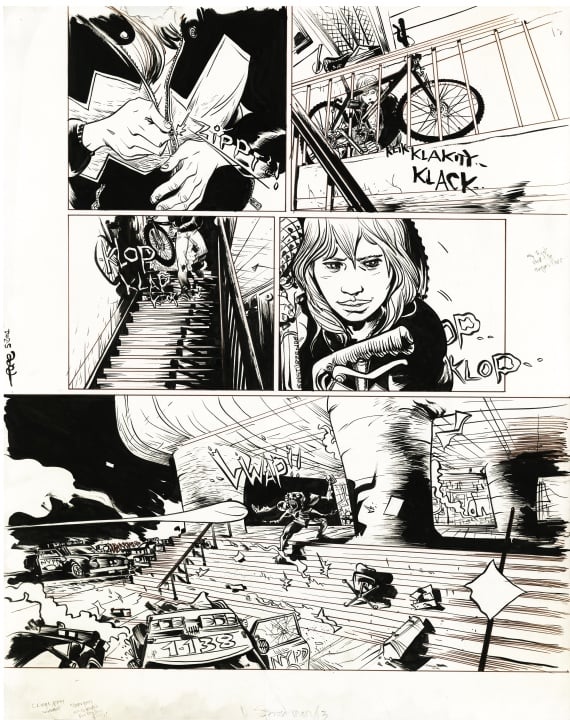
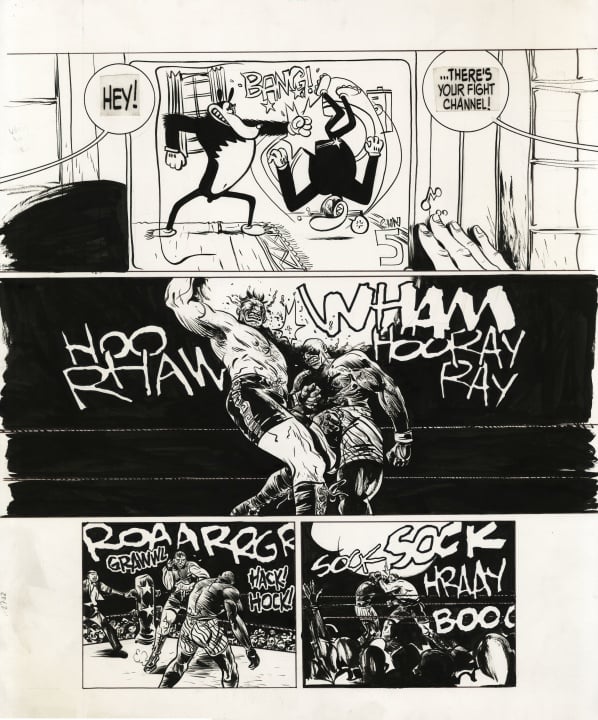
The Paul Pope Exhibit
GVN: Speaking of recognition, starting next month, New York City’s renowned Philippe Labaune Gallery, along with Felix Comic Art, will host a career-spanning exhibit of your work. How did this opportunity come about, and how hard did they have to sell you on the idea of displaying your impressive breadth of work?
PAUL: Honestly, if it wasn’t for my girlfriend Neha this show wouldn’t have come about. She was the one who mentioned to Philippe that we ought to collaborate. We were at the Will Eisner exhibit Philippe hosted months ago, and they just started talking. I am sort of a shy person, actually, so I’d have not suggested it. Philippe offered the chance and we just rolled with it. The timing is really good, though, since my 2nd monograph PULPHOPE2 just came out. So this is the official book launch for the project and a lot of the work in the show is from the book itself.
GVN: When it came to decide what pieces to display, did you have complete control over that or did you work with the Gallery and Felix Comic Art to decide the direction the exhibition would take?
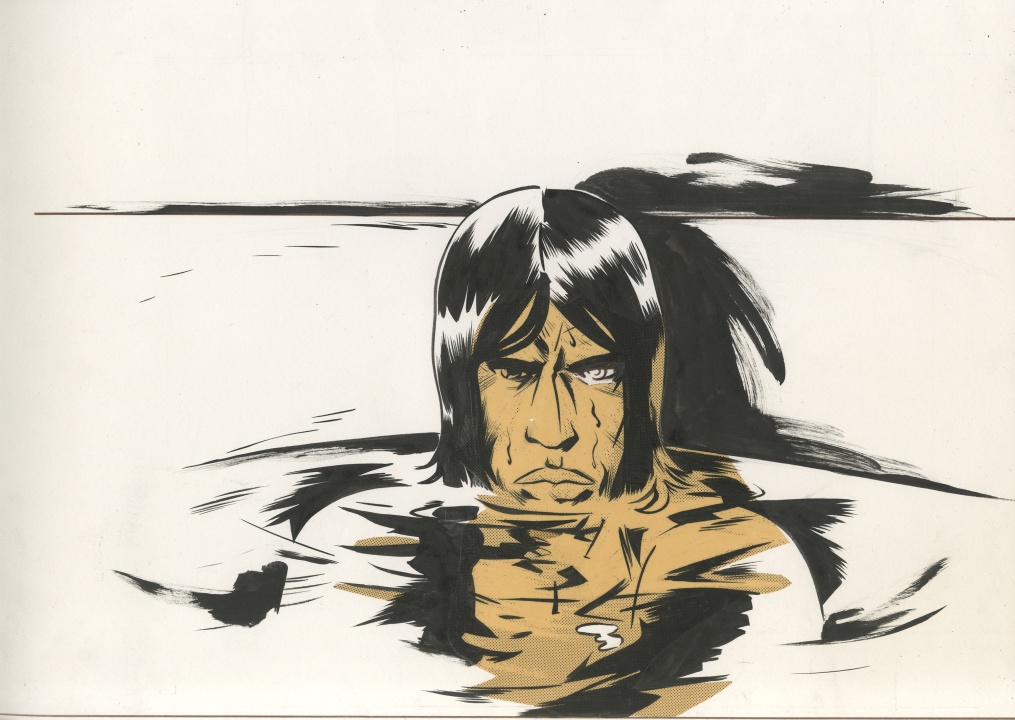
PAUL: It was ultimately Philippe’s decision, he knows his market and what will bring people into the gallery. I think I brought about twice as much work as we finally decided upon. It’s a very good cross-selection of my work stretching almost 30 years, unbelievably. In conjunction with my art rep Felix Lu, they set prices and decided which pieces made the final cut. I think people will be happy to see the originals up close and personal. Most of this work has never been shown publicly.
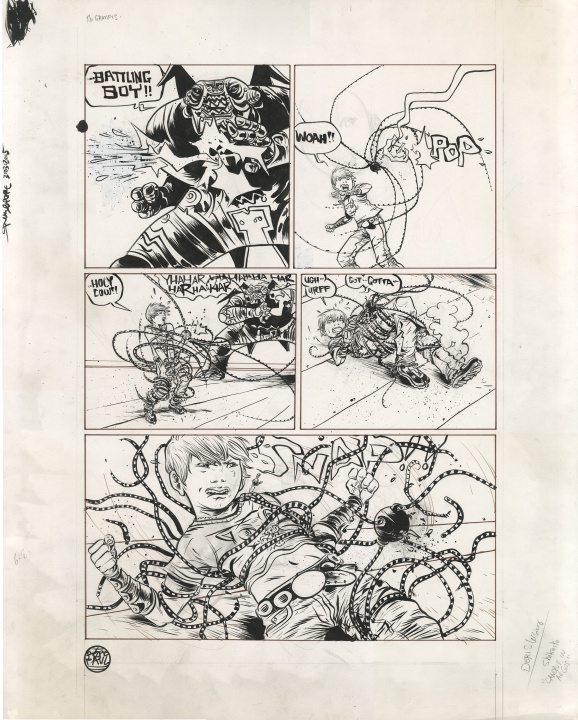
Viewer Takeaways
GVN: This show will go from Thursday, June 19th, through Saturday, July 26th. By the end of the show, what would you hope that those who visit will take away from the exhibit?
PAUL: Well, I chose the name “pulphope” for a reason– we work in pulp fiction and print on cheap paper, we make mass produced disposable pamphlets and paperbacks, but within the lines and words we can contain the greatest ideas or impulses an artist can express. I want people to be inspired by the work and see an example of what you can make happen if you have a stubborn refusal to give up on a dream and you continually keep questioning and searching. When I see original art, I get inspired to work harder. Recently Philippe exhibited pages by Guido Crepax, one of my all-time art heroes. It was very moving and life-affirming. I hope this exhibit can offer that to somebody, in its own humble way.
Upcoming Projects
GVN: Thank you once again for your time, Paul. Before I let you go, please remind our readers about this great exhibit and any other projects you might have upcoming.
PAUL: Thank you! My next book release is the first of the multi-book series, Total THB, collecting over 1000 pages of my “lost” science fiction epic. Book one is out November 2025. I’m also working on finishing Battling Boy 2. When that is collected into one volume, it’ll be over 500 pages. These things take a long time to make! Felix Lu and I also plan to open a new private commission list later this year. I like staying busy.
If you are in the New York area and are a fan of Paul’s work, you can’t go wrong in visiting this exhibit.
The Paul Pope Exhibit will be open to the public from Thursday, June 19th, until Saturday, July 26th.
The Philippe Labaune gallery is located at 534 West 24th Street in New York and is open from Thursday through Saturday, from 10am to 6pm. The roots of Philippe Labaune Gallery have a strong European influence: among the artists are esteemed creators such as Lorenzo Mattotti, Nicolas de Crécy, Guido Crepax, Dave Mckean or François Schuiten. In recent years, American artists such as Landis Blair, Rebecca Leveille Guay, Mike Mignola, Frank Miller, and Peter de Sève have helped Philippe Labaune Gallery to foster a community of overlapping art collectors and comic fans from all over the world.

Senior Writer at GeekVibesNation – I am a 60 something child of the 70’s who admits to being a Star Trek/Star Wars/Comic Book junkie who once dove headfirst over a cliff (Ok, it was a small hill) to try to rescue his Fantastic Four comic from a watery grave. I am married to a lovely woman who is as crazy as I am and the proud parent of a 21-year-old young man with autism. My wife and son are my real heroes.


